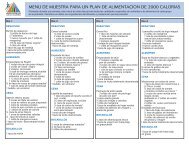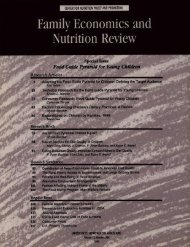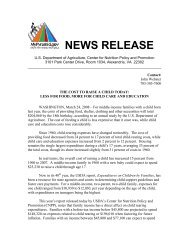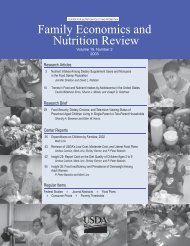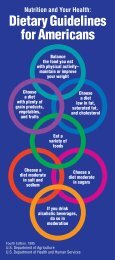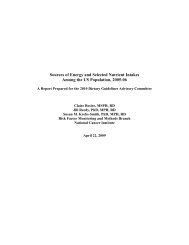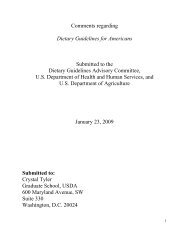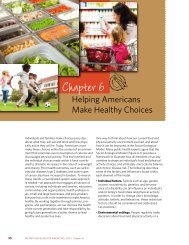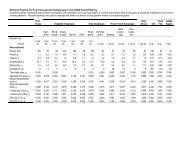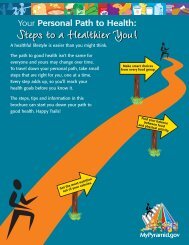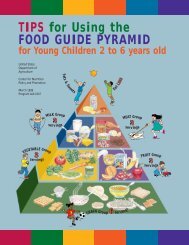Elderly Nutrition - Center for Nutrition Policy and Promotion - US ...
Elderly Nutrition - Center for Nutrition Policy and Promotion - US ...
Elderly Nutrition - Center for Nutrition Policy and Promotion - US ...
Create successful ePaper yourself
Turn your PDF publications into a flip-book with our unique Google optimized e-Paper software.
Using a Concurrent Events<br />
Approach to Underst<strong>and</strong><br />
Social Support <strong>and</strong> Food<br />
Insecurity Among Elders<br />
Edward A. Frongillo, PhD<br />
Cornell University<br />
Pascale Valois, MSc<br />
Fonds de la Recherche en Santé du Québec<br />
Wendy S. Wolfe, PhD<br />
Cornell University<br />
This study tested a concurrent events approach to underst<strong>and</strong> better the<br />
relationships between social support <strong>and</strong> food insecurity of a sample (n=9)<br />
of low-income elders that had participated in an earlier study (n=53) in Upstate<br />
New York. This approach involved the use of time-intensive telephone interviews<br />
over a span of 4 months. Results indicated that the concurrent events approach<br />
provided a fuller underst<strong>and</strong>ing of food insecurity, social support, other events,<br />
<strong>and</strong> experiences among these elderly participants. The researchers found that<br />
the telephone interviews helped with obtaining a better underst<strong>and</strong>ing of the<br />
elders’ “monthly cycle” of food insecurity <strong>and</strong> the importance of food exchange<br />
as a source of social <strong>and</strong> food support among elders, a finding that had not<br />
been captured in the two in-depth retrospective interviews of the earlier study.<br />
M<br />
any elders experience hunger<br />
<strong>and</strong> food insecurity because of<br />
low incomes, limited mobility,<br />
or poor health (Cook & Brown, 1992;<br />
Cohen, Burt, & Schulte, 1993; Lee &<br />
Frongillo, 2001a; Nord et al., 2002).<br />
Food insecurity among elders contributes<br />
to poor diet <strong>and</strong> malnutrition,<br />
which exacerbates disease, increases<br />
disability, decreases resistance to<br />
infection, <strong>and</strong> extends hospital stays<br />
(Administration on Aging, 1994;<br />
Torres-Gil, 1996; Lee & Frongillo,<br />
2001b). Food insecurity is defined as<br />
“the inability to acquire or consume an<br />
adequate quality or sufficient quantity<br />
of food in socially acceptable ways, or<br />
the uncertainty that one will be able to<br />
do so” (Radimer, Olson, Greene,<br />
Campbell, & Habicht, 1992).<br />
Food insecurity among the elderly also<br />
includes the inability to obtain <strong>and</strong> use<br />
food in the household (e.g., to gain<br />
access to, prepare, <strong>and</strong> eat available<br />
food) because of functional impairments,<br />
health problems, or lack of<br />
social support (Lee & Frongillo, 2001a).<br />
Social support affects whether an<br />
elderly person with financial or physical<br />
limitations or both experiences food<br />
insecurity. This support can result<br />
from in<strong>for</strong>mal social networks, such<br />
as family <strong>and</strong> friends, or more <strong>for</strong>mal<br />
programs, such as food programs<br />
(Wolfe, Olson, Kendall, & Frongillo,<br />
1996). Functional impairments, health<br />
problems, <strong>and</strong> lack of social support<br />
have significant relations with food<br />
insecurity (Burt, 1993; Frongillo,<br />
Rauschenbach, Roe, & Williamson,<br />
1992; New York State Department<br />
of Health <strong>and</strong> Office <strong>for</strong> the Aging,<br />
1996; Qu<strong>and</strong>t & Rao, 1999; Roe, 1990;<br />
Wolfe et al., 1996). Social support<br />
<strong>and</strong> food insecurity interact in complex<br />
ways. At least partly due to methodological<br />
limitations, these interactions<br />
are neither well understood nor easy<br />
to study (Lee & Frongillo, 2001c).<br />
For example, equivocal evidence has<br />
revealed the buffering effect of social<br />
2003 Vol. 15 No. 1 25



